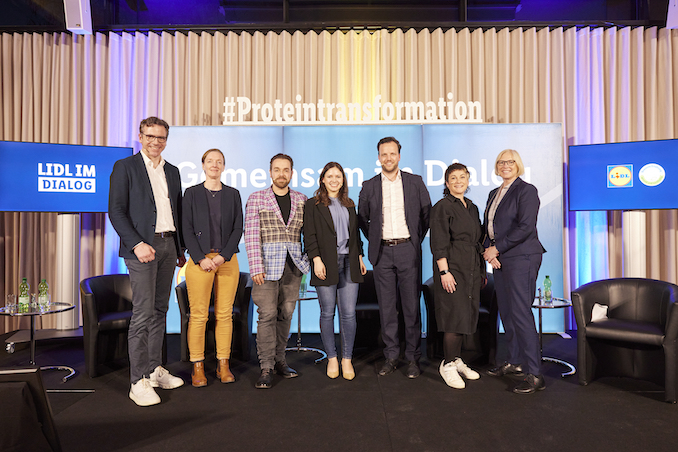Lidl expects higher prices

What will the protein supply of the future look like? How do we achieve greater animal welfare? What does society expect from the actors in the food chain? At the invitation of Lidl in Germany, around 110 representatives from politics, business, science and society came together in Berlin on Wednesday to find answers to these and other questions as part of the “Lidl in Dialogue” discussion format.
By welcoming the guests present, Jan Bock, deputy CEO of Lidl Service GmbH & Co. KG., opened the evening and introduced the topic of the event. As a food retailer with over 3.250 branches, Lidl reaches millions of customers in Germany every day and contributes to their nutrition with a wide variety of everyday products. Lidl is aware of this responsibility for society and the environment, emphasizes Bock at the event and explains the fresh discounter's protein strategy as well as the ambitious goals as part of the strategy for conscious nutrition, with which Lidl is actively driving forward the transformation for a sustainable diet. This includes the pioneering role that Lidl is taking in expanding the plant-based range and transparently disclosing the ratio of plant-based to animal protein sources in the range. In addition, the food retailer has successfully aligned the prices for the range of Lidl's own vegan brand Vemondo with comparable products of animal origin. Lidl is pleased with the positive response from customers, which has been accompanied by an increase in the number of vegan items sold by over 30 percent since the price adjustment six months ago. The respective Vemondo products are now deliberately placed next to their animal counterparts in order to offer customers better orientation and easier access. At the same time, the meat range is also consistently developing in terms of animal welfare standards: Lidl, for example, will completely switch fresh beef to levels 3 and 4. In addition, Lidl consistently pursues the goal of strengthening local agriculture and sourcing animal products as well as fruit and vegetables entirely from Germany.
Dr. Christine Chemnitz, director of the think tank Agora Agrar, explained in a keynote speech the potential of reducing consumption of animal products in order to contribute to socially agreed sustainability goals such as climate neutrality and the protection of biodiversity. She also showed how this change in consumption would affect agriculture in Germany and the EU. Eva Bell, head of department at the Federal Ministry of Food and Agriculture (BMEL), explained, among other things, the federal government's nutritional strategy and emphasized the importance of plant-based proteins for nutrition within planetary boundaries. In the subsequent panel discussion, Eva Bell, Dr. Gereon Schulze Althoff, Managing Director of the Tönnies Group, Christoph Graf, Purchasing Manager at Lidl Service GmbH & Co. KG., Hendrik Haase, publicist and consultant, and Dr. Katharina Riehn, Vice President of the German Agricultural Society (DLG), explains how the proportion of plant-based protein sources can be increased, sustainable consumption can be made more widespread and the topic of animal welfare can be further developed.
Viewers were able to contribute their questions from the audience and digitally via the chat function of the event's live stream. The answer to the evening's question, as the representatives from politics, business, science and society agreed, is that all actors, from producers to retailers to consumers as well as politicians, pull together and make their contribution to protein transformation must.
“What we take away from today's discussion is that the transition to a healthy and sustainable protein supply opens up great opportunities but also challenges for everyone involved in the food chain. Protein transformation is an important and long-term process that is of great interest among the population and the economy,” said Jan Bock, summarizing the dialogue. “At Lidl, we are helping to shape this change by enabling our customers to make increasingly conscious and sustainable purchasing decisions that are affordable and easily accessible for everyone. We will continue to consistently push forward the expansion of a more sustainable range in the future and implement appropriate measures.”
